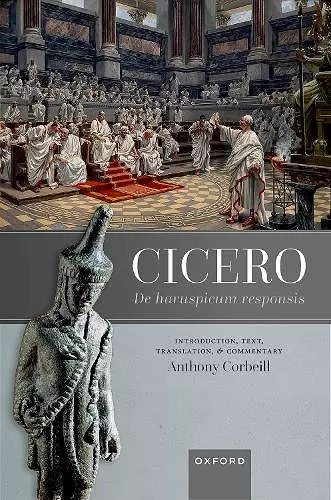Cicero, De haruspicum responsis
Introduction, Text, Translation, and Commentary
Format:Hardback
Publisher:Oxford University Press
Published:25th Aug '23
Currently unavailable, and unfortunately no date known when it will be back

During the Roman Republic, any unnatural event occurring in nature--from a talking cow to a hermaphrodite to an earthquake--was deemed a prodigium. A prodigy signaled awareness of a rupture of order not only in nature but in politics and morality. As a result of its cosmic significance, any potential prodigy demanded authentication. Unsurprisingly, prodigies proliferate during political crises, such as the violent times of 56 BCE. What perhaps does occasion surprise is that in the process of expiating a prodigy, the Roman senate monitors each individual step. And yet, despite the hundreds of allusions to prodigies in ancient texts, only one source provides insight into the senatorial process of analysis, assessment, and resolution. That text is Cicero's speech before the senate, De haruspicum responsis ('On the Responses of the Haruspices'). On this occasion the senators summon for assistance a group of Etruscan priests (haruspices). Herein lies an apparent paradox: the senate entrusts an elemental decision about divine attitudes to a group of foreign priests from the obscure culture of a long-conquered people. The haruspices duly produce from their books of Etruscan lore a cryptic response. This response--the only version of such a response surviving--became the subject of a speech delivered by Cicero's archnemesis Clodius, detailing how Cicero's return from exile prompted this disruption of the natural world. The next day, Cicero argues in De haruspicum responsis the opposite: in the presence of Clodius, he engages in a character assassination that corresponds with a close line-by-line reading of the response. Cicero teaches the senate how to read Clodius's guilt in the reaction of the natural world. In addition to explicating rhetorical and syntactic features, this commentary details the interplay of Etruscan and Roman religious traditions. During a period of gang violence, arson, and murder, the haruspical response achieves what Cicero, Clodius, and the Roman senate could not have effected unaided: introduce into senatorial deliberations a seemingly objective assessment of divine intention. Through rational political debate, a peaceful natural world is restored, one that rests upon the logical analysis and rhetorical prowess of a Cicero.
It accurately represents Cicero's thoughts and rhetorical flourishes without being overly modern or slavishly modeled on his often-ornate sentences. The commentary is a mine of information. Corbeill excels at explicating textual issues and the finer points of Latin grammar and lexicography, and his remarks on Roman politics, rhetoric, and Roman and Etruscan religion are invaluable. Anyone interested in these topics will find Corbeill's book invaluable and indispensable. * Choice *
[This edition] will undoubtedly constitute the reference text for Cicero's oration and which represents, if I may say so, a true monumentum aere perennius for the de haruspicum responsis. * Andrea Balbo, Bryn Mawr Classical Review *
In the thorough commentary, Corbeill provides expert notes on the wide range of issues touched on in the speech. He makes full use of the extensive relevant literature, including some hard-to-find dissertations, early editions, and commentaries. Anyone who reads the book attentively will learn a great deal about the Latin language in general and Cicer's syntax and diction in particular. Corbeill sheds light on a number of points that previous translators or commentators have either glossed over or simply got wrong. * Andrew R. Dyck, Project Muse *
ISBN: 9780192868954
Dimensions: 242mm x 160mm x 28mm
Weight: 778g
408 pages